After my mother passed away in 2013, and after the pomp and circumstance of a military funeral with honors at the Great Lakes National Cemetery in Holly, Michigan, where her body would have to wait until Spring thaw to be buried, and after enjoying the edible flower arrangements, cookies and casseroles brought as offerings to the grieving family, it was time to decide where her possessions would go.
Destined for the Goodwill was an imposing framed print of the Last Supper that had graced the living room where my mother resided for the last several months of her life in a reclining chair. Magi could no longer sleep in the bed she’d shared for half a century with my father who had passed in 2010, as fluids would gather in her lungs and she would not be able to breathe. So she had to sleep at a slant. IF she could fall asleep. When I sat with her during several of these interminable nights near the end, I would tell her “It’s okay to go.” And she’d say, “I know. But it’s so hard.”
Her jewelry was swiftly disseminated among her four daughters, along with some of her clothing. As the eldest child, I claimed her “marching clothes,” a blue-jean shirt dotted with peace and feminist buttons, a black cape and fedora that she had worn in 2004 at the March for Women’s Lives where she and I had both traveled together to make a stand on abortion.
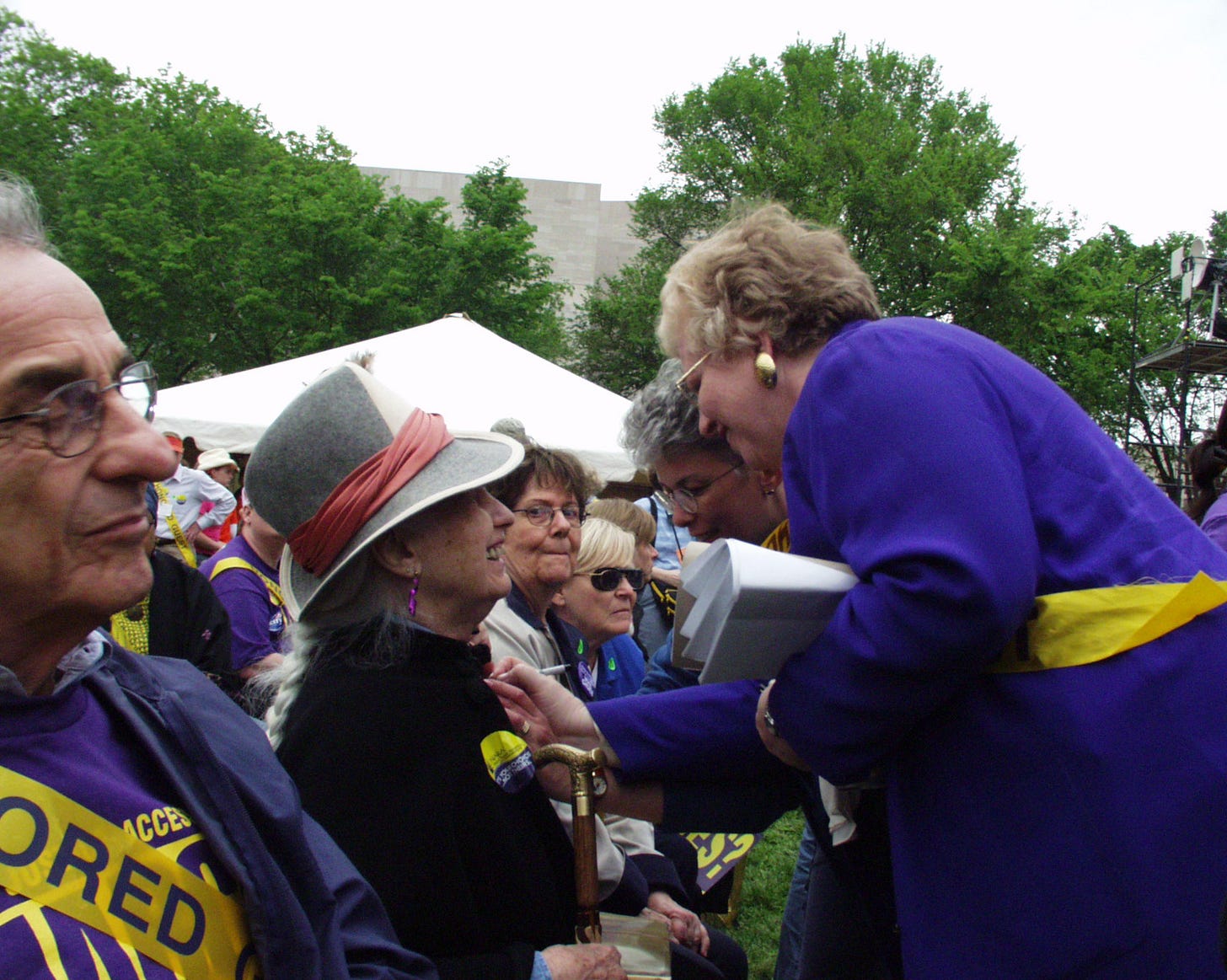
I flew home to California with a few other remnants of my mother’s life, including a book manuscript about her that a journalist named Phyllis Lublin had written but never published, and a box of audio cassettes containing conversations between the two women, as well as Magi’s philosophical musings.
Considering how far ahead of her time my mother was - 50 years, to be exact - the space between 1974 and 2024 is a hop and a skip. I think you will note, as I have, that not much has changed in the way Motherhood dictates that a woman naturally accepts a second place role in her own life.
Throughout their conversations, Magi, a Catholic, and Phyllis, a Jew, both confront this mandate followed so unquestioningly for so long by so many that even now, childfree women are castigated as “selfish” or told that we’ll change our minds, or that we’ll regret it when we’re old and infirm and have no children to care for us.
That’s why I feel that the book lovingly made by Phyllis and Magi, after having lain dormant in a file cabinet for 50 years, deserves its day in the sun.
The Ungluing:
Why Does a Woman Take Second Place in Her Own Life? - by Magi with Introduction by Phyllis Lublin
Who am I? A question you might well ask, for it is one I have been asking myself regularly for the past three years of my life. For the first thirty-odd years I went about the business of living like everyone else. I had always been a loner, keeping to myself all the lonely thoughts that had grown from my earliest years. I was a very private person until I met and married my husband at the age of twenty-one.
Shortly afterward, I received my B.A. in English (a secondary teaching certificate) and shortly after that I gave birth to our first daughter. Four years later, our second daughter was born, and four years after that, our son came into the world. Was there something magic in the number four? I don't think so. I couldn't even call it good planning -- just a series of events that seemed to fall every (National) election year!
Having grown out of a child-parent relationship that was less than desirable, I was determined to make an open comfortable home-life for my family. Being an intelligent, totally committed person, I put everything I had into doing the best possible job. I became, you might say, a model wife and mother. My house was clean, my children were properly dressed and fed.
My husband was proud of me (I knew that even though we had little time to talk about it because our lives were so full of the obligations of job and family). I took time to stimulate my children's creativity and I used my own creativeness to make interesting meals, sew clothes for the girls, refinish furniture, make accessories for our home... I could go on and on. Life, for me, was a constant hum of activity. I couldn't understand how women could be bored in the housewife role. There was never any time to think about being bored!
My husband and I have had a 'normal' marriage. That is, while we had little money and little time to spend with each other, we were taking care of what had to be done and we were tired enough at night to sleep well. I always had a kind of gnawing feeling that he and I were leading our own separate lives and coming together in the evening to discuss what had to be decided between the two of us. Saturday nights were special. We would go out either alone or with other couples, but still, the conversation never touched close enough to the marrow. We were 'getting by' and it seemed to be enough. Besides, there was always 'tomorrow' when the children would demand less and less. Was I living for tomorrow?
Yes, I believe I was. But three years ago, I began to be faced with the terrible realization that tomorrow had come and gone for me. I was thirty-three years old, and something was happening. A slow something. I began to look beyond the fixated image of myself. The self (defined) is the identity, character; one's own person as distinct from all others. When I looked seriously for self, all I could see were the faces of my children. I began to see time ticking away at my expense. It was mirrored in the faces of my children for they were becoming, and I had to ask myself the question, 'who am I?'
It was the hardest question I had ever asked, and I cried because I knew, as yet, there was no answer. I could not look at the self in my face because I had fooled myself. I didn't like what I had become because I hadn't become anything! I had gotten married and brought a child into the world every four years. Now, three children later, looking around me, I couldn't put my finger on anything I had really done. I could look at my children and my husband and try to calculate woman-hours put into their needs, their grooming. But those things had intangibly become part of them, not me!
This slow something that was happening became even more apparent when I decided to find a part-time job. I went to a local newspaper and filled out an application as a reporter. A feeling of nausea passed through me when I got to the second page. It asked for previous work experience. My God! I had never worked! I had done a little clerical work for my father years before, and I had done some of my husband's typing from a small insurance practice, but I had no experience in the field that appealed to me most! I didn't get the job.
I read through the want ads only to discover the positions I was qualified for could best be labeled as menial labor. How degrading for an intelligent person like me! No, I didn't want to be a waitress or a barmaid or even a hostess. I was doing those things now, only without monetary compensation. No, I didn't want to stand on my feet all day and sell things to people that I wouldn't buy myself. No, I wouldn't sit at a desk and answer somebody's phone and mail because I found it unrewarding to answer my own! I do like to type, but could I find meaning in the useless liturgy of routine office work? Not a person with my talents!
After many months of berating myself, pity began to subside, and intelligence took over once more. I was profoundly influenced at this point in my life by a British folk-rock singer named Cat Stevens. His music spoke, with simplicity, of the world he saw moving falsely around him. I found I could identify with his message. It inspired me to reach inside my soul and express myself musically. Carole King, American and female, was another songwriter whose words and music made sense to me. My mind began to dip back to the years before I had children to a time when music had filled my life. I had played piano and guitar in those earlier carefree days. I had intended at one point to become a writer. I had been good at writing... once.
But the twelve years of performing in the wife and mother role had somehow interfered with those plans. There never seemed to be any time for me to sit down and write in all those years. Besides, the role I was now playing had become the most important facet of my life. Is that what it was, really? Or would I be more honest with myself if I admitted that the life I was leading did not lend itself to any creative interest or effort. My mind was not producing; therefore, it had nothing to talk about. The life I was engaged in had already been covered completely by Dr. Spock!
I started writing music. I began to take lessons, first on the guitar and then on the piano, to improve the meager skills that had sat dormant over the years. My love for music began to return to a mind that had all but shut it off. It was so difficult for me -- terribly frustrating -- because I had always felt so intelligent, and here I was having to start all over again to use a part of my mind that had rusted from lack of stimulation. Oh, I had always kept myself abreast of current matters. I spoke well and I used an ever-widening vocabulary. But it had been a long time since I had taken the time to write down what I was thinking inside my head. This was a new discipline for me, and it was time-consuming.
In the last couple of years, I have written poetry, newspaper articles, and even a couple of musical plays. I had a few things published and one of my plays (written for children) was performed at the local Jewish Community Center. I felt a new confidence growing. My husband was proud of my accomplishments, too, although he recognized even before I did that my new-found interests were taking away from my old obligations!*
The duties that once filled my waking hours almost entirely were still in need of my services, but they were becoming secondary, and I watched myself reaching more and more to the music and the words and... the meaning. While I began to use my mind in an original sense, the energies expended were thoroughly draining. I couldn't discover myself fast enough. And all the while, tugging at my thought strings, were the children and the husband and the house. Did you know that a house is a person? It is. It can be as important, maybe more so, than any other human being in a woman's life! I have discovered this fact along with many others.
One of the discoveries I made was that I was becoming irritable... very irritable. Noticeably irritable. Crowding my creative thoughts was guilt-driven adherence to duty, and it was becoming 'distasteful' (to say the least!) I was neglecting, more and more, the husband and the children and the house (in that order) which led me to another discovery.
I am indispensable! I am so necessary that when I don't function in the proper capacity, neither does anything else! When I didn't perform for them, the children and the house and a small part of the husband began to go... awry. It was a terrible sight to witness! It was like turning down a time clock. I was in perpetual motion and everything around me had slowed to a standstill. Everything around me was dependent upon me and I had stopped functioning in the proper capacity. You must try it sometime (if you're a wife and mother); it is a marvelously funny thing to watch (if you have a damn good sense of humor).
It was a nightmare. The woman who once had everything under control, under her control, was now filled with indecisiveness. I was literally being divided into two separate entities and they were extremely incompatible. There was (me) the worker, who could make home and family function so well. And there was (me) the thinker, with a degree of creativeness, who had begun looking beyond the dish and the spoon. The solution should have been simple. Take care of the family when they're home and write when you get time to be alone. Simple. Right? No, it was not that simple.
For fourteen of my fifteen plus years of married life, I had never had more than two-and-a-half hours to myself.
That time delineation represents a certain segment of the day that had been eked out for me, from naptime, nursery school and kindergarten. You see, I had spread my child-rearing years out to the point that it would take fourteen years, come September, for all the children to be in school all day! Come September (it sounds like the title of a book), I would have the time I need to write. It seemed like a dream already too far removed from my thinking, and I continued to write despite the constant interruptions; the only difference being that I made life miserable for everybody, including myself.
Guilt is a terrible thing. It can cloud your thinking, make you feel more tired than any amount of physical labor, and drain your level of tolerance for everything, including life itself. I wanted to express myself, to leave something behind... perhaps for posterity. And yet I had taken on responsibilities in life that committed my time elsewhere. Besides, I could not really be sure I was good enough to give up one for the other. It was a conflict that took up more time than my writing.
Performing menial chores for the husband and the children and the house vs. original thinking. Over a period of two years, I had begun to begrudge laundry-time, meal-fixing-time, cleaning-time, time-for-the-children and husband-time, and they all knew it. Time! That is a nasty four-letter word! But at the same time, I was intuitive enough to know the children needed me. I knew my husband could feel my pain, but he couldn't share it because he was doing what he wanted to be doing (teaching school) for a good part of the day. What was more, I knew he was doing it for me and the children, and when he was home, he enjoyed being with the children more and more as I withdrew. More guilt!
Love for my husband and children went deep... too deep. It was a feeling of attachment that had started long before marriage or children had even occurred to me. I had experienced inadequacies in my own childhood, and I felt terrible watching the cycle repeat itself, even though the circumstances were entirely different. I am an integral part of all they will become, I told myself, and I know that I can help them achieve their best. That means providing an adequate home life. But if I stand back and devote myself to their achievements, there will be no time left for myself... not for quite a while. And, in light of the precious years I had already taken away from myself, it seemed too great a sacrifice.
I did a lot of self-talking in the wee hours when I was the only one around. I said, 'Talking is important. I am important. I cannot let myself down.' One thought kept pressing. 'Keep truckin' I said. So, I did. I continued writing -- poems, songs, articles... lots of words.... lots of meaning... for me. I continued my own natural lifestyle until I began to look more like my older daughter instead of the mother of three growing children.
I looked around at the other women (my peers) who were dressing up like ladies and performing in the role while I was slipping more and more into the easy dress (jeans and shirts) that suited my picture of the natural person I believed myself to be. I kept getting further 'out' while everybody else was busy working at being 'in.'
When you begin to think consciously, you look around at all the things that had always seemed inhumane in the world. Being a sensitive person, armed with the confidence of a novice, I started to write a novel that would pierce the conscious level of all the ideals I found lacking in the world. I would create a natural hero to recreate these ideals. I would fashion him in the clothing of the day... blue jeans, et al. I portrayed him as a student in the services of the CIA in Europe in the 60's, and, through him and his personal struggle against universal self-ignorance, I would show the world just exactly what was lacking.
I put down my guitar and began to study world politics with a fervor for here, I felt, was the essence. Not only had I become unglued from my superficial lifestyle, but the world, too, was experiencing a revolution -- not as silent as mine, but certainly not any more meaningful, either. Great gobs of people were becoming dissatisfied with their existence... not just me.
Some people who were falling out of step had acquired rather specific labels: hippy, groupie, revolutionary, radical and worse. Some of them had turned to violence to make their points. There seemed to be a universal lack of meaning and justification to this world, and oh Lord, I was looking for meaning and justification!
Everything was a mess. Mine was not the only dirty laundry! It was about this time that Watergate, spiraling to the top, made it apparent. “How come,” I asked myself, “when we cast our bread upon the water, all we get is soggy bread!” Comfort and security were falling apart both at home and everywhere, you might say.
[* Phyllis would eventually end her friendship with Magi and shelf her book at the insistence of her husband.]
[To be continued….]


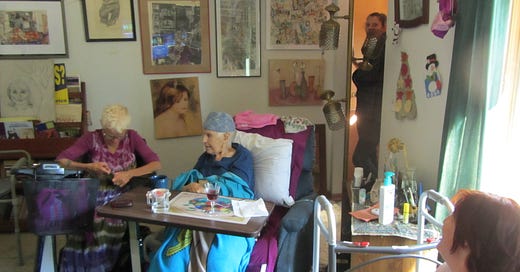



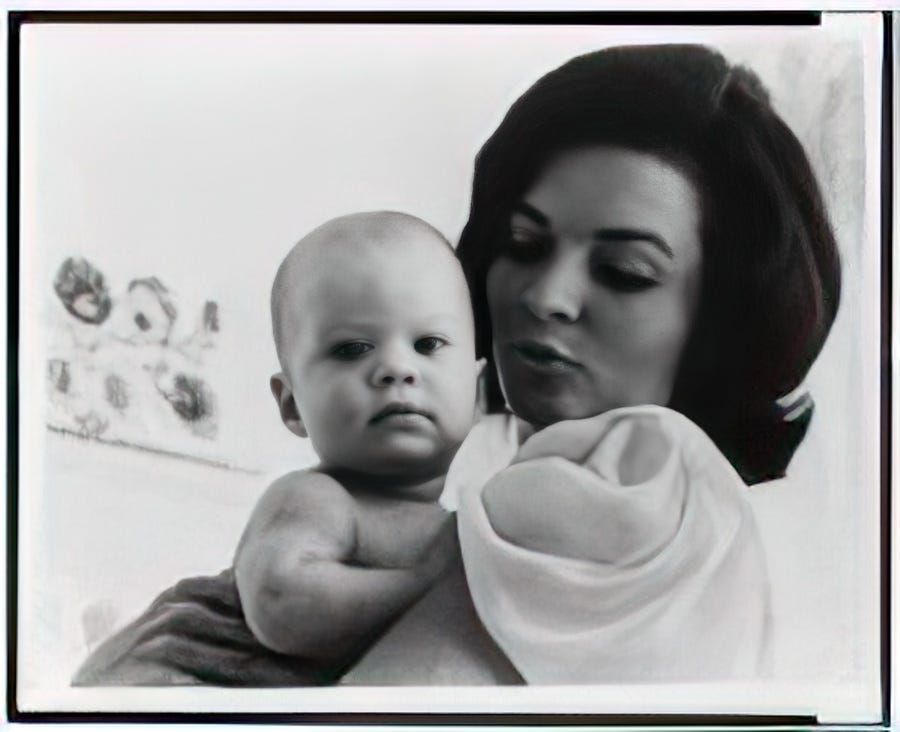
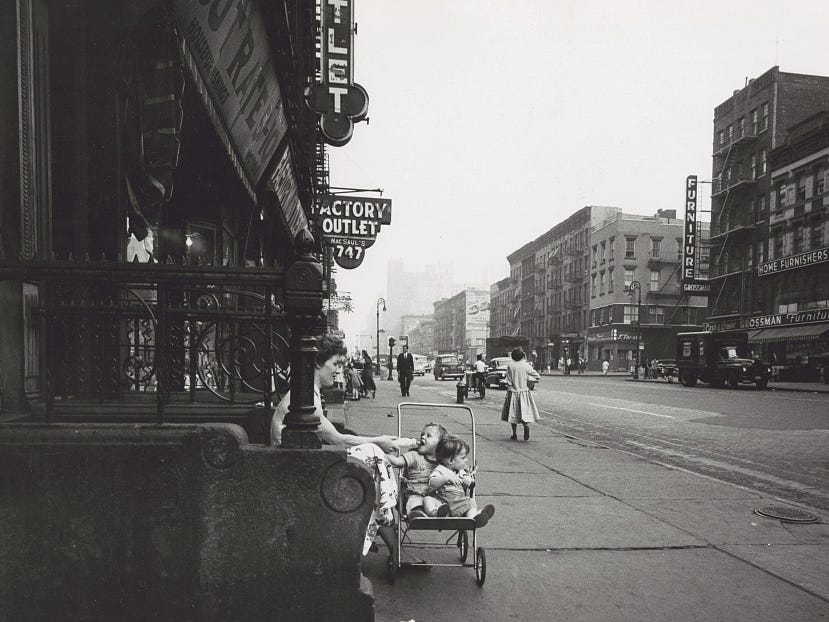
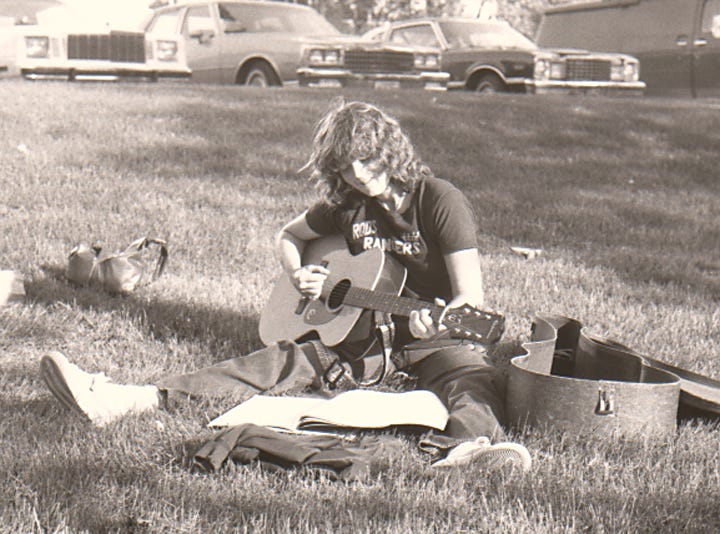

Beautiful. I think about Magi daily, she was a great friend. ❤️
Wow this is amazing I look forward to more! Also I am fascinated about the thing about Phyllis ending the friendship & shelving the book at her husband's insistence! Like was he threatened? It's very interesting!!!!!